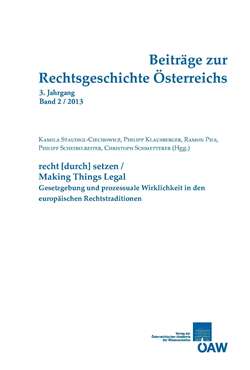
Beiträge zur Rechtsgeschichte Österreichs 2 / 2013, pp. 456-464, 2014/01/30
recht [durch] setzen - Making Things Legal.
Gesetzgebung und prozessuale Wirklichkeit in den europäischen Rechtstraditionen

The present paper shall provide an analysis of the discourse regarding Machtsprüche (‘dictums’) in the elaboration of the codification of the Prussian private law – the “Allgemeines Landrecht für die Preußischen Staaten” – towards the end of the 18th century. A Machtspruch consisted of an authoritative decision by the monarch through which he could intervene in on-going judicial proceedings in civil law matters either by giving a ruling himself or by instructing the court to come to a certain decision. In Prussia the question arose of whether Machtsprüche should be forbidden by law. The paper will reflect the positions of King Frederick II., King Frederick William II., high-ranking Prussian civil servants, and legal reformists in this discourse. It will show that the discourse concerning this question is in a way a continuation of the dichotomy between power on the one hand and law on the other, that was typical of Enlightened Absolutism.